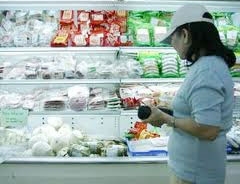Experts warn of more rises to CPI
 |
| illustration photo |
“Vietnam has a low level of consumer credit which means a monetary policy based on high interest rates does not reduce the consumer price index (CPI). Instead it will push up production costs and thus market prices. This in turn will lead to a rise in the CPI, not a reduction,” said economist Dr. Bui Kien Thanh.
In 2010, Vietnam’s CPI reached 11.75 per cent year-on-year, according to the General Statistics Office (GSO) which highlighted the government’s failure to keep the country’s CPI under the predicted 8 per cent. The Vietnam dong, meanwhile, continued to weaken against the US dollar.
Prompted by suggestions that a tightening of monetary policy was required, Vietnam’s State Bank raised the basic interest rate to 9 per cent in November last year. At the time, many experts said that should inflation continue to increase, additional measures would need to be made.
Thanh pointed out that many factors other than monetary policy affected the CPI. These included foreign exchange policy, fiscal policy, inefficient public investment and the hike in prices of essential commodities such as coal, electricity, petroleum and water.
“Speculation and corruption - which increase construction costs and create pressure for higher prices - also play a role. It is unreasonable to hastily adjust monetary policy while all the factors contributing to the CPI hikes have not yet been clarified,” Thanh said.
Thanh said that in developed countries like the US, where consumer credit ran at about 70 per cent of the total credit, to apply a high interest rate would directly impact on consumer credit and quickly lower prices. But in Vietnam, where consumer credit was not yet 10 per cent of the total, the high interest rate would affect enterprises far more than the CPI and prices.
“The current problem for Vietnam is to determine the necessary amount of credit based upon which reasonable interest rates are set out,” he said.
Dr. Quach Manh Hao, deputy director of Thang Long Securities Company agreed, saying that to apply a tight monetary policy with a view to curbing inflation only worked when interest rates were low enough to encourage enterprises to borrow money to invest inefficiently.
“However, with the current high interest rate in Vietnam, a tightening of monetary policy will make it difficult for enterprises to borrow money from banks, while banks are afraid to lend,” Hao said.
According to a recent central bank report, production and service development, which are the prime drivers of the economy, received little credit from lenders. The majority of banks’ lending was divided between state-owned corporations, the real estate market, the stock market and other sectors.
As such, future credit apportionment should be top priority, said Thanh.
He said that Vietnam needed to examine policy implementation and enterprises’ usage of capital to ensure that their borrowing would not be transferred to financial speculation or other sectors.
What the stars mean:
★ Poor ★ ★ Promising ★★★ Good ★★★★ Very good ★★★★★ Exceptional
Related Contents
Latest News
More News
- Kurz Vietnam expands Gia Lai factory (February 27, 2026 | 16:37)
- SK Innovation-led consortium wins $2.3 billion LNG project in Nghe An (February 25, 2026 | 07:56)
- THACO opens $70 million manufacturing complex in Danang (February 25, 2026 | 07:54)
- Phu Quoc International Airport expansion approved to meet rising demand (February 24, 2026 | 10:00)
- Bac Giang International Logistics Centre faces land clearance barrier (February 24, 2026 | 08:00)
- Bright prospects abound in European investment (February 19, 2026 | 20:27)
- Internal strengths attest to commitment to progress (February 19, 2026 | 20:13)
- Vietnam, New Zealand seek level-up in ties (February 19, 2026 | 18:06)
- Untapped potential in relations with Indonesia (February 19, 2026 | 17:56)
- German strengths match Vietnamese aspirations (February 19, 2026 | 17:40)

 Tag:
Tag:




















 Mobile Version
Mobile Version